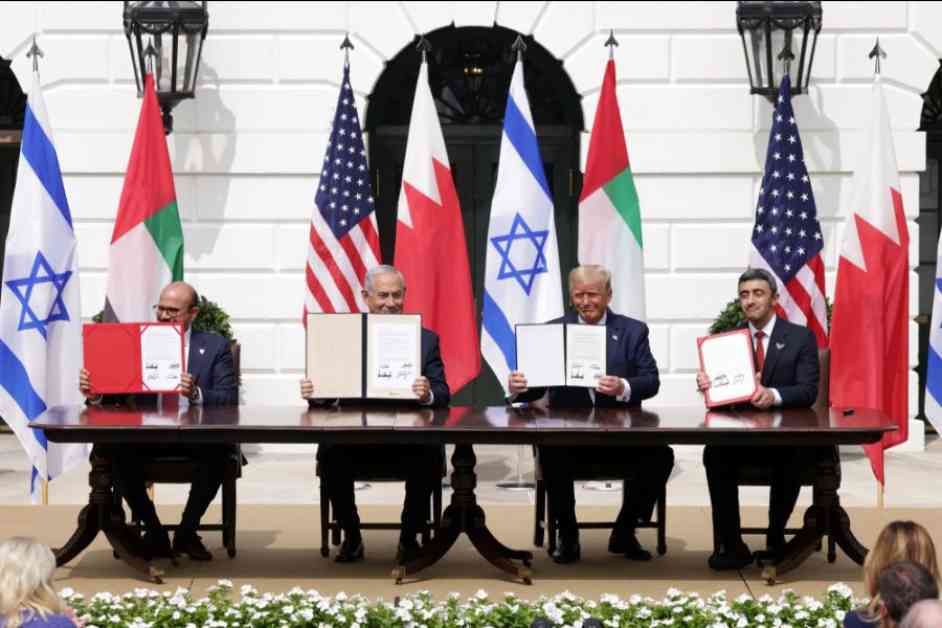Reimagining Peace: The Transformative Impact of the Abraham Accords
In December 2016, former US Secretary of State John Kerry made a statement at the 13th annual Saban Forum that reverberated throughout diplomatic circles: “There will be no advanced and separate peace with the Arab world without the Palestinian process and Palestinian peace. Everybody needs to understand that.” Kerry emphasized the interconnectedness of peace efforts in the Middle East, highlighting the importance of addressing the Palestinian-Israeli conflict as a central pillar of any comprehensive peace agreement.
He also echoed the famous three “noes” from the post-1967 war Khartoum Conference, firmly rejecting the idea of peace between Israel and the Arab nations independent from the Palestinians: “No, no, no, and no.” This stance has long been a cornerstone of international diplomacy in the region, emphasizing the need for a holistic approach to peace-building.
However, as times change and new opportunities arise, it is crucial to reassess traditional approaches to peace in the Middle East. The Abraham Accords, signed on September 15, 2020, between Israel and the United Arab Emirates (UAE) and Bahrain, represent a groundbreaking shift in the region’s diplomatic landscape. This bilateral agreement normalized relations between Israel and these Arab nations and served as a catalyst for potential peace initiatives across the Middle East.
The Practical Impact of the Abraham Accords
One tangible outcome of the Abraham Accords is the normalization of social and economic relations between Israel and the UAE. Previously, travelers to the UAE with Israeli stamps in their passports faced raised eyebrows and potential challenges. However, following the Accords, direct currency exchanges between dihrims and shekels are now possible at Dubai airport, symbolizing a newfound openness and cooperation between the two nations.
The economic benefits of the Accords are evident in the significant increase in Israeli visitors to the UAE, with over one million Israelis traveling to the country in a single year. Additionally, the establishment of kosher restaurants and the first purpose-built synagogue in the Arab World in nearly a century demonstrate the growing cultural and religious exchange facilitated by the Accords. These developments underscore the transformative impact of diplomatic initiatives on people-to-people relations in the region.
Promoting Interfaith Relations and Mutual Understanding
The Abraham Accords serve as a beacon of hope for meaningful interfaith relations and cross-cultural dialogue in the Middle East. By bringing Israeli-Arab relations out into the open, the Accords have paved the way for civil society initiatives that promote sporting, cultural, and religious exchanges between the two sides. This increased interaction and cooperation have fostered a sense of mutual understanding and respect, challenging long-held stereotypes and prejudices.
Moreover, the Accords have highlighted the deep historical and cultural ties that exist between Israeli society and Arab nations, dispelling the notion of irreconcilable differences. The model of “warm peace” established by the Abraham Accords emphasizes the potential for lasting reconciliation and cooperation between societies that have been historically divided.
The Path to Comprehensive Peace in the Middle East
As tensions persist in the region, particularly between Israel, Iran, and various Arab states, the Abraham Accords stand as a beacon of progress and cooperation amidst regional animosity. The willingness of nations to set aside longstanding grievances and work towards mutual understanding and partnership demonstrates the potential for broader peace initiatives in the Middle East.
The Accords also hold the promise of creating an environment conducive to advancing the Israeli-Palestinian peace process. By fostering trust and cooperation between Israel and its Arab neighbors, the Accords lay the groundwork for a viable two-state solution that ensures security for Israel and self-determination for the Palestinian people. This interconnected approach to peace-building underscores the importance of addressing regional conflicts in a comprehensive and inclusive manner.
In conclusion, the Abraham Accords represent a significant step towards reimagining peace in the Middle East. By challenging traditional paradigms and fostering cooperation between former adversaries, the Accords offer a pathway to lasting reconciliation and stability in the region. As the international community continues to navigate complex geopolitical challenges, the lessons learned from the Accords can serve as a blueprint for future peace initiatives in the Middle East and beyond.

